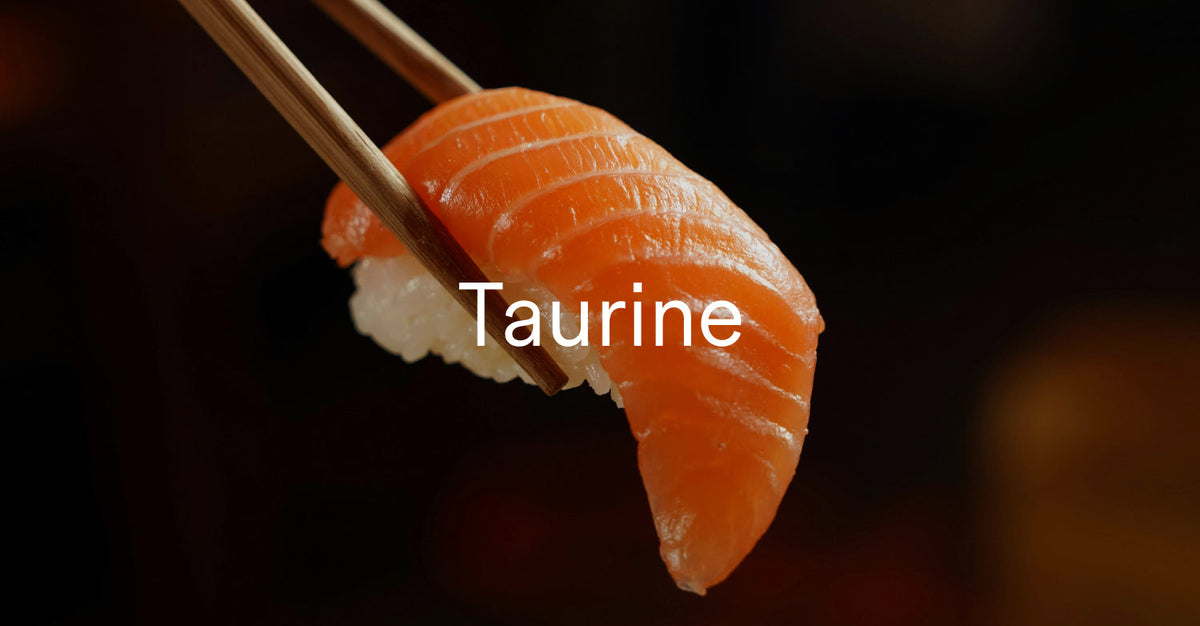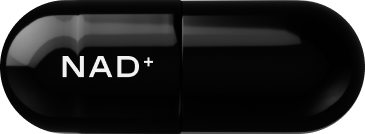

When most people hear taurine, they think of energy drinks. But here’s the truth: taurine is so much more than a caffeine sidekick. This abundant amino acid plays critical roles in your brain, heart, metabolism, and even immune function. In fact, scientists are discovering that taurine benefits may extend to healthier aging, cardiovascular health, and better exercise performance.
Let’s break down the science of taurine, why your body needs it, and how taurine supplementation could support long-term health.
What is Taurine, Exactly?

Taurine is an amino acid, but unlike other amino acids, it doesn’t build proteins. Instead, taurine acts as a cellular helper molecule, supporting essential processes across the body:
Bile acids & digestion → Taurine helps form bile salts, which are critical for digesting fats and regulating cholesterol metabolism.
Cardiovascular function → Oral taurine supplementation has been shown to help lower blood pressure, improve vascular function, and support cardiac function in heart failure patients.
Antioxidant properties → Taurine protects cells by reducing oxidative stress and neutralizing harmful reactive oxygen species.
Mitochondrial function & energy metabolism → Taurine plays a role in energy production, helping your cells function efficiently.
Nervous system → Taurine helps support nerve growth and calcium homeostasis, which influences everything from muscle contractions to brain signaling.
In short? Taurine isn’t flashy—it’s foundational.

The Health Benefits of Taurine
Here’s what science says about the potential health benefits of taurine supplementation:

1. Cardiovascular Health
Taurine has been studied as a therapeutic agent for cardiovascular disease, metabolic syndrome, and congestive heart failure. Research has shown that taurine administration can help improve endothelial function, reduce arterial blood pressure, and even improve exercise capacity.
2. Blood Pressure & Vascular Function
In both humans and small mammals, taurine treatment has been linked to a significant decrease in blood pressure and improvements in endothelial function. By reducing oxidative stress biomarkers, taurine supports smoother blood flow and cardiovascular resilience.
3. Exercise & Muscle Recovery
From endurance exercise performance to recovery, taurine may help reduce delayed onset muscle soreness and improve skeletal muscle function. Athletes and everyday movers alike may benefit from taurine supplementation for improved energy metabolism and muscle health.
4. Metabolism & Diabetes
Taurine plays a role in glucose metabolism and insulin resistance. Some studies suggest taurine administration may help regulate blood sugar and improve metabolic syndrome markers, making it promising for diabetic complications.
5. Brain & Nervous System Support
Taurine helps regulate neurotransmitters and maintain proper hydration in cells. Research suggests it supports brain health, nerve growth, and overall cognitive performance.
Taurine Deficiency: Why It Matters

While the body can make small amounts of taurine, dietary taurine intake is crucial. Taurine deficiency has been linked to developmental issues in low birth weight infants, impaired immune system function, and increased risk for cardiovascular dysfunction.
The problem? Most taurine comes from animal-based foods like meat and seafood. That means people on plant-based diets may have lower taurine levels and could benefit from orally administered taurine supplements.
Taurine Supplements: What to Know
Most taurine supplements are considered safe amino acid options when taken at an appropriate oral taurine dose. Taurine compared to other amino acids is unique because of its reported broad, whole-body benefits.
And unlike caffeine-packed energy drinks, taurine supplementation is thought to provide the beneficial effects without the jitters or crash.
One great example? Sharpen by Tally Health, which combines taurine with other science-backed ingredients to support cognitive performance, mitochondrial function, and long-term brain health.
Taurine Benefits and Healthy Aging

Here’s where things get exciting: researchers are now studying taurine as a potential anti-aging compound. Early evidence suggests taurine protects against oxidative stress, supports immune function, and improves cardiovascular health—all factors that decline with age.
In other words, maintaining healthy taurine levels might be a key piece of the longevity puzzle. That’s why products like Sharpen by Tally Health, which include taurine alongside synergistic compounds, are designed to give your brain and body the long-term support they need.
Takeaway

Forget the energy drink hype—taurine is a natural amino acid with real, science-backed benefits. From supporting brain health to improving exercise performance and protecting against oxidative stress, taurine plays a key role in whole-body wellness.
Whether you’re looking to improve endurance, protect your heart, or give your brain a long-term edge, taurine supplementation may be worth considering.
The bottom line: taurine isn’t just for athletes or energy junkies—it’s for anyone interested in better health, stronger performance, and healthier aging.
References
Singh et al. Taurine deficiency as a driver of aging. Science 2023; https://doi.org/10.1126/science.abn9257
Gebara et al.Taurine increases hippocampal neurogenesis in aging mice. Stem Cell Res 2015; https://doi.org/10.1016/j.scr.2015.04.001
Bae et al.The Development of Taurine Supplementary Menus for the Prevention of Dementia and Their Positive Effect on the Cognitive Function in the Elderly with Dementia. Adv Exp Med Biol 2019; https://doi.org/10.1007/978-981-13-8023-5_32
Santulli et al. Functional Role of Taurine in Aging and Cardiovascular Health: An Updated Overview. Nutrients 2023; https://doi.org/10.3390/nu15194236
Baliou et al. Protective role of taurine against oxidative stress (Review). Mol Med Rep 2021; https://doi.org/10.3892/mmr.2021.12242
What are the main benefits of taurine?
Taurine supports heart health, brain function, metabolism, and exercise recovery. Studies show it helps regulate blood pressure, improve energy metabolism, and protect cells from oxidative stress—making it a key nutrient for longevity and overall wellness.
Is taurine safe to take as a supplement?
Yes. Taurine supplements are generally considered safe when taken in recommended doses. Unlike caffeine, taurine doesn’t cause jitters or crashes. It can support cardiovascular, cognitive, and muscular health without overstimulating the nervous system.
Can vegetarians or vegans be deficient in taurine?
Possibly. Since taurine is found mainly in animal-based foods like meat and seafood, people on plant-based diets may have lower taurine levels. Supplementation can help maintain optimal taurine levels to support metabolism, brain function, and heart health.










